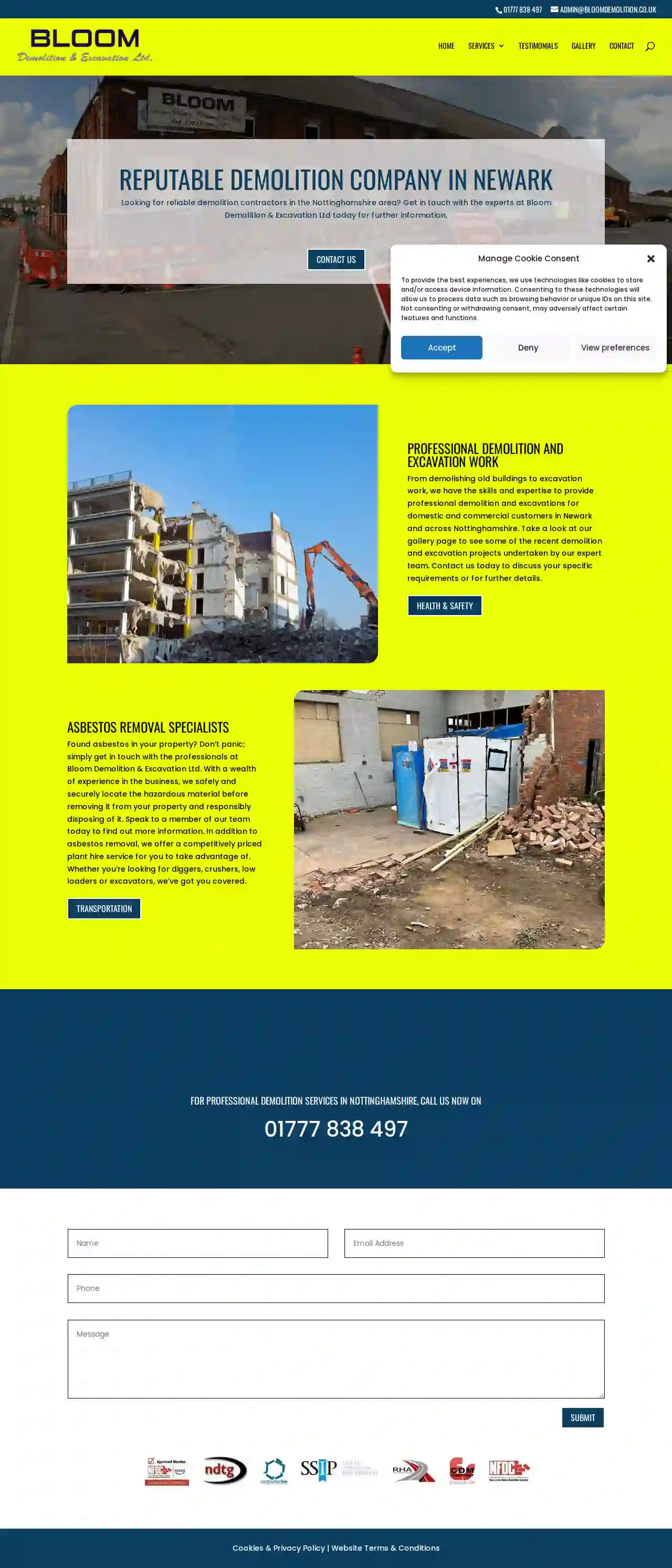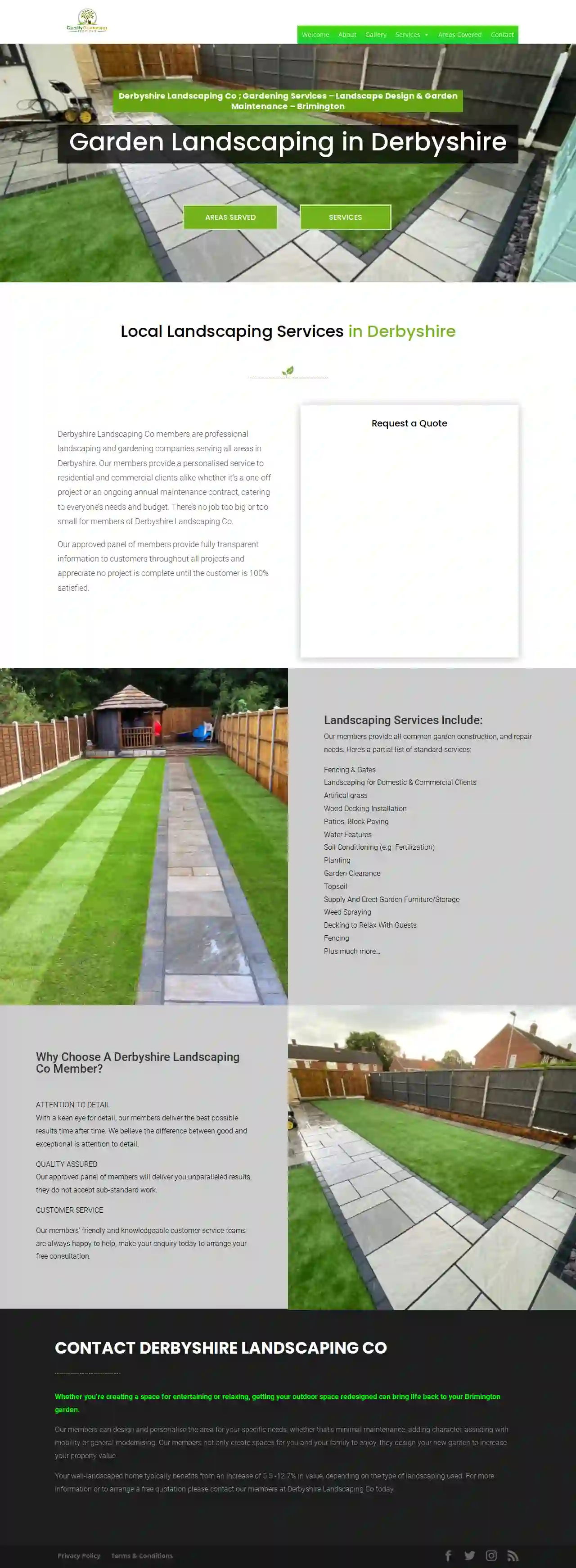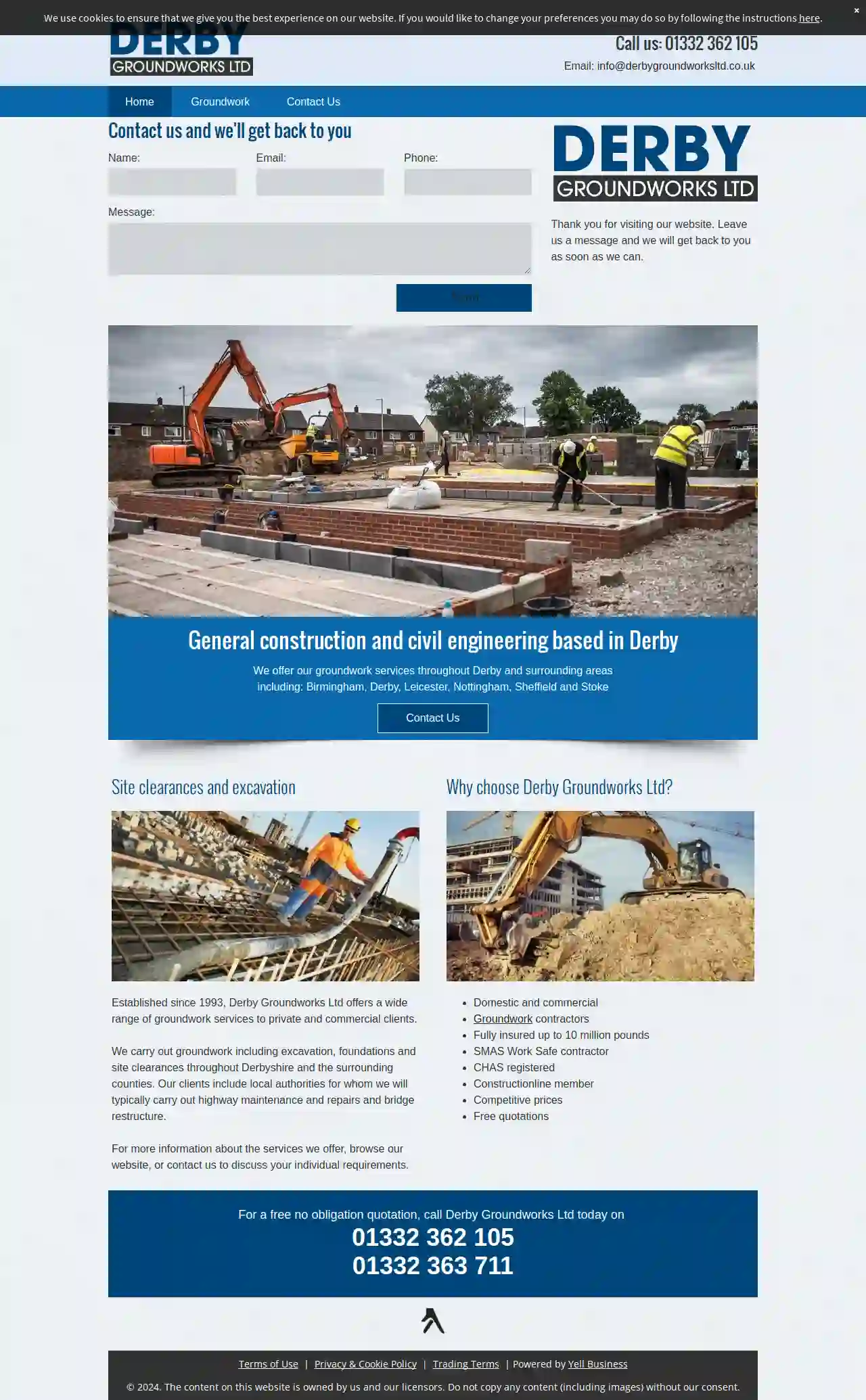Excavation Contractors Mickleover
Top Excavating Contractor in Mickleover
Receive multiple Land Excavation quotes for your project today! Compare profiles, reviews, accreditations, portfolio, etc... and choose the best offer.

G R Day Operated Mini Diggers, Extension Bases and Excavations.
525 reviews18 nesfield close, alvaston, derby, derbyshire, Derby, DE24 0QT, GBAbout G. R. Day With over 20 years of experience, G. R. Day offers a reliable and professional service. Fully insured and CPCS qualified, there's not much Gavin hasn't done on a digger. He has a variety of attachments for his machines, including land rakes, riddle buckets, ripper teeth, and grabble thumbs. He also has concrete breakers to make light work of breaking out concrete drives, concrete bases, and existing footings. Why Choose G. R. Day? Over 20 years of experience DBS Checked Fully insured CPCS qualified Professional and reliable Get in touch for your free, no-obligation quote today.
- Services
- Why Us?
- Our Team
- Testimonials
- Gallery
Get Quote
Bloom Demolition & Excavation Ltd
3.36 reviewsDerby, GBReputable demolition company in Newark Looking for reliable demolition contractors in the Nottinghamshire area? Get in touch with the experts at Bloom Demolition & Excavation Ltd today for further information. Professional demolition and excavation work From demolishing old buildings to excavation work, we have the skills and expertise to provide professional demolition and excavations for domestic and commercial customers in Newark and across Nottinghamshire. Take a look at our gallery page to see some of the recent demolition and excavation projects undertaken by our expert team. Contact us today to discuss your specific requirements or for further details. Health & safety Asbestos removal specialists Found asbestos in your property? Don’t panic; simply get in touch with the professionals at Bloom Demolition & Excavation Ltd. With a wealth of experience in the business, we safely and securely locate the hazardous material before removing it from your property and responsibly disposing of it. Speak to a member of our team today to find out more information. In addition to asbestos removal, we offer a competitively priced plant hire service for you to take advantage of. Whether you’re looking for diggers, crushers, low loaders or excavators, we’ve got you covered.
- Services
- Why Us?
- Gallery
Get Quote
Griffin Groundworks Limited
52 reviews20 Park Road, Spondon, Derby, DE21 7LN, GBGriffin Groundworks are specialists in Groundworks, Tarmac Driveways and Block paving. We provide free no obligation quotes! GRIFFIN GROUNDWORKS LTD. Griffin Groundworks Ltd. offer a wide range of services including groundwork, excavating, driveways, tarmacking, block paving stone and concrete works. If you’re looking for a reliable, trustworthy, and efficient builders to tackle your projects, then you’ve come to the right place. With a diverse portfolio of contracting work, we have the experience to manage a large variety of different projects. PROFESSIONAL CONSULTING SERVICES Griffin Groundworks Limited can provide professional advice for any projects planned and can be there from the first day right through to when the project is complete. Our experience built over the years, means we have a vast wealth of knowledge to allow us to tackle any project head on. LATEST WORK Below are some images of the latest work carried out by Griffin Groundworks Limited.
- Services
- Why Us?
- Gallery
Get Quote
LA Landscaping Services LTD
Derby, GBDerbyshire Landscaping Co: Your Trusted Partner for Garden Transformation Derbyshire Landscaping Co is a network of professional landscaping and gardening companies serving all areas in Derbyshire. We are dedicated to providing personalized services to both residential and commercial clients, whether it's a one-off project or an ongoing annual maintenance contract. We cater to everyone's needs and budget, ensuring there's no job too big or too small for us. Our approved panel of members are committed to providing fully transparent information to customers throughout all projects. We believe in building trust and ensuring complete satisfaction, so no project is considered complete until you are 100% happy with the results. We understand that your outdoor space is an extension of your home, and we are passionate about creating beautiful and functional gardens that you can enjoy for years to come. Whether you're looking to create a space for entertaining, relaxing, or simply adding character to your property, our members can design and personalize the area to meet your specific needs. Our services include: • Fencing & Gates • Landscaping for Domestic & Commercial Clients • Artificial Grass • Wood Decking Installation • Patios, Block Paving • Water Features • Soil Conditioning (e.g., Fertilization) • Planting • Garden Clearance • Topsoil • Supply And Erect Garden Furniture/Storage • Weed Spraying • Decking to Relax With Guests • Fencing • Plus much more… Why Choose Derbyshire Landscaping Co? • **Attention to Detail:** Our members have a keen eye for detail, ensuring the best possible results time after time. We believe the difference between good and exceptional is attention to detail. • **Quality Assured:** Our approved panel of members will deliver unparalleled results, as they do not accept sub-standard work. • **Customer Service:** Our members' friendly and knowledgeable customer service teams are always happy to help. Make your enquiry today to arrange your free consultation. Investing in landscaping can significantly increase your property value. A well-landscaped home typically benefits from an increase of 5.5 - 12.7% in value, depending on the type of landscaping used. Contact our members at Derbyshire Landscaping Co today for more information or to arrange a free quotation.
- Services
- Why Us?
- Gallery
Get Quote
BD Yates Construction Ltd
56 reviewsBens Barn, Main Street, Elton, DE4 2BW, GBAn established construction firm based in the heart of the Peak District National Park. We pride ourselves on the quality of our work and our trademark friendly and professional service. Having been working within a partnership for the last 20 years, we have built on the experience and knowledge from a well-known family business which cater for all types of Construction and Groundworks. We have over 20 years experience in new builds and extensions within the Peak District National Park and Derbyshire Dales, so we have the ability to take any site from conception through to realisation meeting exacting standards. In addition to building work & alterations, all joinery work including kitchen fitting is carried out by ourselves to the highest standard to suit our customers style and taste. We have a vast amount of experience in Groundworks & Landscaping covering; Site preparation, Driveways, Patio’s, Services & Drains and all types of Excavation. We undertake a wide range of work from small scale projects for private customers to large scale commercial enterprises. Please see our up-to-date progress on our Facebook page. We pride ourselves on our Customer Satisfaction and always endeavour to ensure all work matches our exacting customer requirements. All our estimates are free and without obligation
- Services
- Why Us?
- Testimonials
- Gallery
Get Quote
Subscan Midlands - Drainage Derby, Derbyshire
Subscan House, 126 Whitehall Road, Leeds, LS12 1AE, GBContact Us To enquire about any of the extensive range of services we provide, simply fill out the form opposite with your details, select a department and let us know what we can help you with. We’ll get right back in touch with you as soon as possible. At Subscan we’re here when you need us. Select Required Department 24 Hour Emergency Drainage Response Emergency Flood Response 24/7 Highways Services Jet-Vac Tankers Jet-Vac Recycling Tankers Jet-Vac Super Recycling Tankers Off-Road Jet-Vac Recycling Tankers Gully Tanker Hire Bulk Waste Disposal CCTV Drainage Survey CIPP Relining CIPR Patch Lining UV Lining Drain Repair & Excavations IMS Robotic Cutting & Lateral Reopening Planned Preventative Maintenance Culvert Cleaning and Inspection PAS 128 Cat D PAS 128 Cat C PAS 128 Cat B PAS 128 Cat A Percolation Tests Commercial & Industrial Cleaning Topographical Surveys Measured Building Survey 3D Laser Scanning Drone Surveys Engineering Surveys Where are we? Subscan House, 126 Whitehall Road Leeds LS12 1AE Phone: 0344 499 5220 Unit 2, Nelsons Court, Pontefract St., Derby DE24 8JD Phone: 0344 967 2332 Email North Office: [email protected] Midlands Office: [email protected] South Office: [email protected] Scotland Office: [email protected] Social Facebook: @subscan Twitter: @Subscan_UDS LinkedIn: Subscan UDS Ltd Instagram: Subscan_uds
- Services
- Why Us?
- Our Team
- Gallery
Get Quote
Midlands Equipment Hire
560 reviewsUnit 1 Halter Devil Farm, Intakes Lane, Turnditch, Belper, Derbyshire, DE56 2LU, GBMidlands Equipment Hire Midlands Equipment Hire specializes in the hire of small construction plant and earth moving equipment. Our equipment includes, but is not limited to, micro and mini diggers, small dumpers, attachments, and tool hire. We stock a range of brands to suit all requirements. Ideally located in the heart of England, we provide hire to Derbyshire and the surrounding areas. Contact us today to discuss how we can provide a hire solution for your business. Booking plant has never been easier, we pride ourselves on making hiring Mini Diggers, Dumpers and more as simple as possible. Midlands Equipment Ltd is authorized and regulated by the Financial Conduct Authority, FRN 808385. Midlands Equipment Ltd is registered in England and Wales, registration number 08852513.
- Services
- Why Us?
- Accreditations
- Gallery
Get Quote
A&S Enterprises Ltd
53 reviewsDerby, GBWelcome to A&S Enterprises Ltd Specialists in Commercial Construction With More Than 20 Years Of Experience, A&S Is One Of The Most Established Construction Companies In the Midlands We are a fast-track, award winning contractor, priding ourselves on our performance and customer satisfaction. Whatever the contract, we will ensure a first-class, comprehensive combination of quality, competency and dedication to ensure the end result is exactly what you need.Our specialist core-team areas of expertise include, contracting, development and maintenance to commercial, industrial, education and housing sectors. These include turnkey projects and integrated developments.
- Services
- Why Us?
- Testimonials
- Gallery
Get Quote
Derby Groundworks Lt
51 reviews119 Manor Road, DERBY, Derby, DE23 6BS, GBAbout Derby Groundworks Ltd Established since 1993, Derby Groundworks Ltd is a reputable general construction and civil engineering company based in Derby. We offer a wide range of groundwork services to both private and commercial clients throughout Derby and the surrounding areas, including Birmingham, Leicester, Nottingham, Sheffield, and Stoke. Our team of experienced professionals is dedicated to providing high-quality workmanship and exceptional customer service. We pride ourselves on our commitment to delivering projects on time and within budget, while maintaining the highest standards of safety and environmental responsibility. We specialize in a variety of groundwork services, including: Excavation Foundations Site clearances Highway maintenance and repairs Bridge restructure We are fully insured up to 10 million pounds and are proud members of SMAS Work Safe, CHAS, and Constructionline. We offer competitive prices and free quotations for all our services. Contact us today to discuss your individual requirements and receive a free, no-obligation quotation.
- Services
- Why Us?
- Gallery
Get Quote
Goodward Construction Ltd. - Commercial Construction
Unit 325, Coney Green Business Centre, Wingfield View, Clay Cross, S45 9JW, GBGoodward Construction: Your Trusted Commercial Construction Partner Goodward Construction is a family-run commercial construction company with over 30 years of experience serving Derby, Nottingham, Sheffield, Chesterfield, and the wider areas of Derbyshire, Nottinghamshire, and South Yorkshire. We are dedicated to delivering high-quality construction projects on time and within budget, while exceeding our clients' expectations. Our Commitment to Excellence We pride ourselves on our commitment to integrity, quality, value for money, professionalism, and exceptional customer service. Our team of highly skilled professionals is dedicated to providing a seamless construction experience, from project management to skilled tradespeople. A Comprehensive Range of Services We offer a comprehensive range of building services to support your commercial construction project, from design to completion. We work closely with your team of architects and building surveyors to ensure your vision is realized. We also provide building contractor services for large-scale projects. Why Choose Goodward Construction? Over 30 years of experience in the construction industry A proven track record of delivering successful projects A commitment to quality workmanship and materials Competitive pricing and transparent budgeting Exceptional customer service and communication A focus on safety and environmental responsibility Contact Us Today Whether you require a building contractor or a fully managed commercial construction project, we are here to help. Contact us today for a free consultation and let us help you bring your vision to life.
- Services
- Why Us?
- Gallery
Get Quote
Over 13,059+ Excavation Companies on our directory
Our excavation experts operate in Mickleover & beyond!
ExcavationHQ has curated and vetted Top Excavation Contractors in and around Mickleover. Find the most reliable business today.
Frequently Asked Questions About Excavation Contractors
- Experience: Choose contractors with a proven track record and years of experience in excavation projects similar to yours.
- Licensing and Insurance: Verify that they are properly licensed to operate in your area and carry adequate insurance to protect you from liability in case of accidents or damage.
- Equipment and Resources: Ensure they have the necessary equipment and resources to handle your project efficiently and safely.
- Positive Reviews and References: Check online reviews and testimonials from previous customers. Request references and contact them to inquire about their experience with the contractor.
- Professionalism: Opt for a company that communicates clearly, provides detailed and transparent estimates, and has a responsive and courteous team.
- Sloped Property: Your property has a significant slope, making it prone to soil erosion or landslides.
- Creating Usable Space: You want to level off a sloped area to create a flat surface for patios, gardens, or other outdoor spaces.
- Preventing Damage: Erosion is threatening existing structures, driveways, or walkways.
- Landscaping Features: You're incorporating tiered gardens, raised beds, or other landscaping elements requiring soil retention.
- Trench Collapses: Unstable trench walls can cave in, posing a severe risk to workers. Proper shoring and sloping are crucial safety measures.
- Utility Damage: Striking underground utilities (gas, water, electric) can cause leaks, explosions, or electrocution. Accurate utility locates and careful digging are essential.
- Falling Objects: Materials or equipment falling into excavations can injure workers. Securing work areas and using appropriate safety gear is vital.
- Equipment Accidents: Operating heavy machinery involves risks of rollovers, collisions, or mechanical failures. Trained operators and proper equipment maintenance are critical.
- Environmental Hazards: Excavated soil might contain hazardous materials (asbestos, lead). Proper testing and disposal procedures are necessary.
- Clearly Define the Scope: Outline the project's goals, including the excavation area, depth, grade, and intended use.
- Obtain Necessary Permits: Research and acquire any required permits from your local authorities.
- Mark Utility Lines: Contact your utility companies to locate and mark underground utilities to prevent damage.
- Communicate with Neighbors: Inform your neighbors about the project's timeline and potential noise or disruptions.
- Prepare the Site: Clear any obstacles, such as vegetation, furniture, or structures, from the excavation area.
- Discuss Safety Protocols: Review safety procedures with the contractor to ensure a safe work environment.
How do I find a good excavation contractor?
How do I know if I need a retaining wall?
What are the risks associated with excavation?
What should I do before excavation starts?
How do I find a good excavation contractor?
- Experience: Choose contractors with a proven track record and years of experience in excavation projects similar to yours.
- Licensing and Insurance: Verify that they are properly licensed to operate in your area and carry adequate insurance to protect you from liability in case of accidents or damage.
- Equipment and Resources: Ensure they have the necessary equipment and resources to handle your project efficiently and safely.
- Positive Reviews and References: Check online reviews and testimonials from previous customers. Request references and contact them to inquire about their experience with the contractor.
- Professionalism: Opt for a company that communicates clearly, provides detailed and transparent estimates, and has a responsive and courteous team.
How do I know if I need a retaining wall?
- Sloped Property: Your property has a significant slope, making it prone to soil erosion or landslides.
- Creating Usable Space: You want to level off a sloped area to create a flat surface for patios, gardens, or other outdoor spaces.
- Preventing Damage: Erosion is threatening existing structures, driveways, or walkways.
- Landscaping Features: You're incorporating tiered gardens, raised beds, or other landscaping elements requiring soil retention.
What are the risks associated with excavation?
- Trench Collapses: Unstable trench walls can cave in, posing a severe risk to workers. Proper shoring and sloping are crucial safety measures.
- Utility Damage: Striking underground utilities (gas, water, electric) can cause leaks, explosions, or electrocution. Accurate utility locates and careful digging are essential.
- Falling Objects: Materials or equipment falling into excavations can injure workers. Securing work areas and using appropriate safety gear is vital.
- Equipment Accidents: Operating heavy machinery involves risks of rollovers, collisions, or mechanical failures. Trained operators and proper equipment maintenance are critical.
- Environmental Hazards: Excavated soil might contain hazardous materials (asbestos, lead). Proper testing and disposal procedures are necessary.
What should I do before excavation starts?
- Clearly Define the Scope: Outline the project's goals, including the excavation area, depth, grade, and intended use.
- Obtain Necessary Permits: Research and acquire any required permits from your local authorities.
- Mark Utility Lines: Contact your utility companies to locate and mark underground utilities to prevent damage.
- Communicate with Neighbors: Inform your neighbors about the project's timeline and potential noise or disruptions.
- Prepare the Site: Clear any obstacles, such as vegetation, furniture, or structures, from the excavation area.
- Discuss Safety Protocols: Review safety procedures with the contractor to ensure a safe work environment.